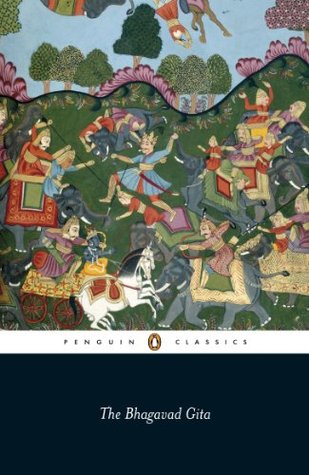More on this book
Community
Kindle Notes & Highlights
Death is fixed for those who are born, and birth is fixed for those who die; since such an end is certain, you should not grieve.
Son of Bharata, beings have beginnings which are formless, and middle states which do have form, and deaths which, again, are formless; why would one grieve over this?
And people will tell stories of your own eternal disgrace; and for those who are esteemed, disgrace surpasses death.
The warriors in their great chariots will think you shrank from the joys of battle because of fear; and where they once thought of you highly, they will now think you unworthy.
And those who are hostile to you will speak many unspeakable words, ridiculing your power. What greater pain is there?
When you have made pleasure and pain the same – also gain and loss, and victory and defeat, then join yourself to battle; and in this way, you will not cause harm.
Joy of the Kurus, this insight here is firm in nature, and singular, but the insights of those who waver are endless, with many branches.
Arjuna, the Vedas belong to the three gunas, and you must be free of the three gunas, free from opposites,13 eternally dwelling in truth, neither acquiring nor keeping, self-possessed.
Your authority is in action alone, and never in its fruits;
motive should never be in the fruits of action, nor should you cling to inaction.
The one who is joined to insight casts off both good and evil acts. So join yourself to yoga; yoga is ease in action.
When your insight is in deep focus, and when it stands motionless, ignoring the revelation which had been heard, then you will reach yoga.
Son of Pritha, when a person renounces all the desires in the mind, that one is said to be content in the self, by the self, and firm in wisdom.
The person whose mind is free from anxiety about sorrows, and free from greed for pleasures, with rage, passion and fear gone, whose thoughts are firm, that one is said to be a sage.
When a person draws in the senses from the sense-objects in every sphere, like a tortoise pulls in its limbs, that one’s wisdom stands firm.
Clinging is born to someone who dwells on the spheres of the senses; desire is born from clinging; and anger is born from desire.
Confusion arises from anger; and from confusion memory strays; from the fall of memory comes the loss of insight; and one is lost when one’s insight is lost.
One not joined to passion and hatred, always moving in the spheres of the senses by the senses, the one who thus restrains the self, and who governs the self, attains peace.
there is no peace for the one who does not concentrate;18 and from where does pleasure come for the one who has no peace?
When the mind is led by the roving senses, then it steals one’s wisdom, like the wind steals a ship on the water.
who has no idea of ‘mine’, and who has no idea of ‘I’, that one comes to peace.
4 One does not reach the state beyond action3 by abstaining from actions; nor does one reach fulfilment only by renunciation.
everyone is made to perform action.
while remembering and mindful of the objects of the senses:


